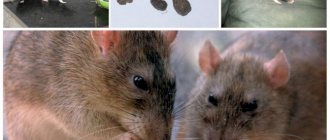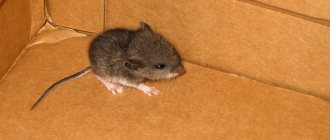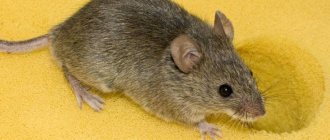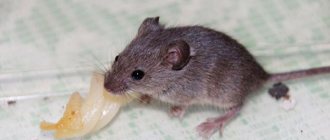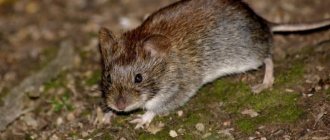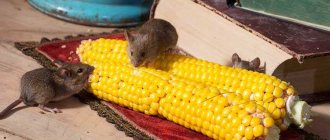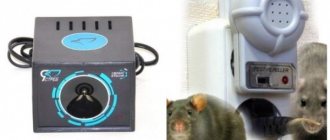Mice are harmful
You should get rid of mice as early as possible, preventing the population from increasing. To do this, you need to use all available methods and means. Not only folk remedies are used, but also more modern innovative technologies, the effectiveness of which has been proven in practice.
The annoying presence of rodents is accompanied by spoiled food and household items. In addition to the fact that mice spoil trees, they destroy crops both in the garden and in storage. Sensing the smell of food, pests are ready to make their way through the walls, gnawing holes for themselves.
The most common way to fight mice is to purchase a cat or cat, which instinctively begins searching for an opponent at the first discovery of traces of rodents. However, not all breeds of pets are adapted to perform such work. Even if a mouse is the only food item, a lazy house cat will not bother to give chase.
Odors that repel mice
If you are afraid to use all sorts of unknown chemicals in your home that may have any side effects, and you need to get rid of mice, then you can use one of the folk methods. In particular, to control pests, use the smell of various plants or artificial flavors that repel mice well.
You've probably wondered: “What smell do mice, rats and other rodents dislike?” You will learn the answer to this question from this article, and at the same time learn how to properly use the acquired knowledge.
Plants
Plants, as well as some grass, are most effective against mice, because it is them that the parasite is mainly afraid of. Most of the herbs that grow in your garden can be great for keeping pesky neighbors away.
So, the plants that do this best are:
- mint. It is better to use this plant as esters or solutions, but in its pure form it will also work well. Leaves should be placed near the holes. Mice run away from mint as if scalded.
- Ledum. This plant is quite poisonous, but it also contains a lot of essential oil, and therefore affects rodents over long distances; they simply cannot tolerate it. To do this, you only need a couple of bunches or branches of the plant.
- Elder. This plant contains a lot of hydrocyanic acid, which has a detrimental effect on small animals, and rats and mice try to stay away. Elderberry bushes are often planted in summer cottages or planted under windows in an apartment building.
The smell of mint repels mice
Other herbs
- Pharmaceutical camomile. Very fragrant, abundantly emits an ethereal-resinous aroma that repels pests.
- Tansy. No one can stand the pungent smell of this plant, not even insects, so several bunches placed throughout the house will be an excellent protection against any kind of parasites.
- Blackroot. The plant is poisonous to both rodents and some insects, and to people themselves, so it is recommended to use black root with extreme caution.
- Sagebrush. Because of its bitter odor, it is often planted in various summer cottages to protect crops. But an apartment is also suitable: wormwood can be dried and placed near the baseboards and behind the furniture. When dried, its smell is sharper.
In order to protect your home, you can try to set fire to fluff, the burning smell of which mice do not particularly like, or rubber. And also fill the holes with kerosene, vinegar or mothballs. But such experiments are dangerous, the smells of burnt rubber and fluff are toxic, and even more so mothballs, vinegar and kerosene.
Therefore, it is better to focus on herbs and plants, they are safe, and some are even medicinal. You can also get a cat. Mice don't like the smell of a cat, but that doesn't mean they fear or hate it. Therefore, the cat is simply an aid.
Wormwood can also be used in pest control
Synthetic flavor
Quite a modern, but very effective way to get rid of rodents. Its essence lies in the fact that it does not emit a smell in the literal sense of the word, but sprays into the room an aroma containing a chemical composition, barely perceptible by the neurons of the brain.
Fragrances are created on the basis of phthalate, a substance that is poisonous in large quantities, but safe for humans in moderate doses. The mouse, having caught this aroma, will immediately hasten to run away from its zone of action, because it even frightens the rodent.
There are also synthetic fragrances that do not contain chemicals, but cosmetic substances or even natural ones. These may cost more, but if you have definitely decided that you will not use an ounce of chemicals, then you can purchase such samples or buy a glue trap.
Can spray synthetic fragrances
Spices
In addition to plants and herbs, spices can also help in the fight against mice. Coriander is the most common and powerful spice that can drive pests out of your home.
Since ancient times, since its discovery, coriander has been used in medicine to treat digestive diseases, stomach ulcers, as well as to treat conjunctivitis and other eye diseases.
Used as an antiseptic. It has a pungent and strong odor, which can sometimes confuse a person.
In order for coriander to show its full potential, it is recommended to crush it into powder (so its smell will be sharper and more pungent) and leave it in saucers or on paper in the corners of the room. If you are afraid to shake off or spill the powder, then you can sprinkle a handful of grains in the same places, and also leave a little behind the furniture.
For summer residents and those who have suburban areas, it is perfect to plant a coriander bush, preferably more than one, so that during flowering its smell does not allow mice to even just approach the house.
Coriander is quite effective
Smells that attract mice
No matter what herbs or spices you use, there are still odors that, on the contrary, attract small pests. The sweetest and most desirable smell for them is food that you did not put away or simply forgot somewhere. In times of hunger, the mouse will not be afraid of either coriander or wormwood, and will run into the house, led by the smell of a forgotten cheese or piece of bread that you might have dropped or left on the table.
Always try to clean up after yourself, disposing of all crumbs and leftover food or washing it down the sink so that the smell from them does not spread throughout the house and does not attract hungry pests. Clean frequently to also get rid of any lost food that may be lying around on the floor. Wash floors with soap, because greasy stains or simply erased traces of spilled liquid products are also smelly.
Cleaning is important when preventing any parasites, be it mice or cockroaches. Cleanliness in the house is the guarantee that various pests will not appear in it for a long time.
And one of the most effective methods is the use of special repellers.
Folk remedies
People, preferring chemicals, do not always know that there are many ways to control rodents. These include all kinds of folk remedies, among which the leading position is occupied by essential oils and fragrant herbs.
Some people prefer the smell of wormwood. You can lay out fresh plucked branches of the plant around the house, or fumigate the room (smoldering wormwood). Mice categorically cannot stand such a smell and leave their habitual place.
Interesting: The ancestors believed that the smell of wormwood could drive away evil spirits.
Mint is the head of everything
If the smell of wormwood is specific and may not be tolerated by some household members, then the aroma of peppermint will be an excellent alternative. This plant has many advantages, such as:
- an indispensable sedative;
- has healing properties;
- exudes a pleasant aroma, refreshing the surrounding area;
- repels rodents and other insects, as well as pests.
Using mint against rodents is the most humane way to expel mice and rats. At the same time, pets feel calm. There are several options for using mint.
Plant
One of the simplest and absolutely inexpensive ways to use mats is to lay out fresh branches in each room where traces of the presence and activity of mice (mouse droppings) are found. In addition, you can plant a row of mint around the perimeter of the house, which, in addition to performing protective functions, will serve as an excellent decoration for the area. The leaves of the plant can be used both in cooking and for preparing medicinal decoctions and potions.
Dry mint
The versatility of mint is obvious. In addition to the fresh plant, dry leaves are widely used in everyday life. To combat mice, a sock filled with dry leaves is used as a quick solution. This container is filled and tied tightly, subsequently laying out peculiar bags around the house near all existing holes through which mice could theoretically get through.
Spray
It's very easy to prepare a mint-flavored liquid to spray using a spray bottle. Fresh or dried mint leaves are added to boiling water to create an aromatic liquid. The concentrated solution must be judged and poured into plastic bottles with a spray cap.
This aromatic infusion is suitable for treating the entire room. You need to spray all cabinets, shelves, containers and rooms where rodent activity has been recorded. To enhance the effect, you can add a few drops of essential oil to the solution.
Peppermint oil
Peppermint essential oil can be added to the prepared solution intended for spraying the room. It is also recommended to place cotton pads soaked in mint oil throughout the rooms. An added bonus is a homemade air freshener.
To prepare the spray solution, you need to follow the following recipe:
- water – 300-400 ml;
- mint oil – up to 15 drops (it all depends on the tolerance of the smell to household members);
- alcohol or alcohol-containing tinctures – 10 ml.
The prepared mixture should be shaken well and only then begin to treat problem areas. You shouldn't apply too much product.
Basic ways to repel rats
Almost any pungent odor repels rats, since rodents’ sense of smell is better developed than other receptors. In addition to unpleasant aromas, you can influence rodents using sounds. Parasites do not like sharp and loud bangs or impacts. Nowadays you can buy devices that produce sounds that humans cannot hear.
20 most effective remedies for rats and mice
Smells
Knowing what smell rats don’t like, you can use it to influence the animals. This method is one of the safest and most humane. At the same time, most products with the necessary aroma can always be found at hand. The main thing is to know how to use rat “aromatherapy” correctly.
Peppermint
Peppermint is one of the main odors that mice and rats cannot tolerate. You can use mint extract, solution, oil or greens. The grass should be placed near mouse holes and areas where rodents have been seen. You can rub the floors with oil or solution.
Ledum
Another time-tested folk remedy is wild rosemary. The plant intoxicates rats and mice, so rodents try to avoid the grass. Ledum is suitable for use in the house, country house, and garage. The plant is poisonous, so you need to work with it with caution.
Elder
Hydrocyanic acid is a toxic substance that has a detrimental effect on rodents. It is contained in elderberry. Therefore, experienced gardeners often plant shrubs near fruit trees and other plantings. It is also effective to place elderberries near outbuildings. Use at home must be done with caution so that other animals and children do not have access to the plant.
Chamomile
The pleasant aroma of chamomile is unbearable for rats. Therefore, rodents try to immediately leave the home where there is the smell of a flower. Chamomile is used dry and fresh. It is safe for households and other animals. The product can be easily purchased at a pharmacy.
Sagebrush
Wormwood will help preserve the harvest from rodents and scare away rats from the premises. Mice cannot stand the bitter aroma of the grass. Therefore, animals try not to be near the source of the aroma. Wormwood is used in fresh and dried form. Can be placed at home and in utility rooms.
Mint
Mint or lemon balm will help protect not only the supply of vegetables in the basement, but also the food stored in the cupboards at home. The grass is placed in bags and laid out in the required places. The aroma of mint has no negative effects on humans, but is unpleasant to mice. Rodents leave the area saturated with the smell of grass.
Tansy
The pungent smell of tansy is unbearable for rats and mice. Parasites cannot tolerate tart aroma. Therefore, with the help of several inflorescences you can quickly and permanently repel rodents. To prevent the appearance of uninvited guests, it is recommended to periodically replace tansy with fresh specimens and place them in places where rodents have been spotted.
Pyrethrum
Pyrethrum is safe for humans. The aroma of the plant is well tolerated by other animals, but is unpleasant to rats. Pyrethrum foliage, stems and flowers are used. They must be placed in rodent habitats.
Blackroot
Black root has been used by people for a long time to repel rats and mice. Fresh plant juice, dry rhizomes or a decoction of them are used to bait rodents. The plant is added to bait, and after eating it, the rat dies. Dried and fresh grass simply repel pests. At the same time, the aroma of black root is not felt by humans. You can put it in the trunk of your car, at home, or in the garage.
It is recommended to place blackroot seeds and stems in the attic, pantry or under the floor. It is necessary to place several branches of the plant in haystacks to prevent rodents from making a nest there.
Essential oils
Essential oils have a high effect. They have a high concentration of odor, so the aroma remains in the air for a long time. To repel rats, you can use essential oils of mint, tea tree, tansy and wormwood.
It is recommended to soak a cotton swab in oil and place it near rodent habitats. If a rat gets dirty in oil, it will die. This effect of the product can also be used in pest control.
Ultrasound
An effective way to repel mice is to use ultrasonic devices. Electronic repellers emit ultrasonic waves that rodents cannot tolerate. Advantages of repellers:
- safety;
- efficiency.
Flaws:
- high cost of devices;
- limited capabilities of the device if there is a large amount of furniture in the room.
Among the most popular and effective models are:
- "ElectroCat Turbo" - the effective impact area is about 400 square meters. m. A domestically produced device that costs 2,000–2,500 rubles rids a room of rodents in a matter of hours.
- “Pest Riddex” is an imported decorative device designed for an area of 200 square meters. m. The cost of the device is 1,600–2,000 rubles.
After turning off the device from the network, there is a possibility of rodents returning to the room.
Additional methods
You can scare away rats with harsher substances. Among the folk remedies you can find turpentine, kerosene, cologne, ashes from the skins of killed rats, etc. All substances are toxic and have a pungent odor. Therefore, the use of most products in an apartment or residential building is impossible.
Kerosene
It is recommended to spray the habitats of parasites with kerosene. In basements and attics it makes sense to install a container with liquid. The smell of fuel will emanate constantly. Therefore, rodents will try not to return to their habitual place. If the animal gets into the liquid, it will die.
Naphthalene
Naphthalene has a sharp, specific odor. The solid substance not only repels rodents, but is also toxic to them. It is recommended to mix naphthalene with sawdust and scatter the mixture in mouse habitats. Such flooring will cause animals to panic and try to leave the room. It is recommended to use mothballs to remove rodents from non-residential premises.
Turpentine
Turpentine has a similar effect to kerosene. The liquid has a pungent odor that causes discomfort to living beings. It is recommended to coat the corners of the room with turpentine, or place a container with it next to mouse holes. The aroma of fuel persists for a long time and does not dissipate well, so rodents do not appear for a long time.
Burnt fluff
Burnt feathers are another effective method of repelling parasites. Pests cannot tolerate the smell of burnt fluff and avoid its locations. You can burn any feathers. Duck down has the most unpleasant aroma. Ashes must be mixed with starch and scattered in places where rodents have been seen.
Burnt rat fur
It is believed that rats are acutely aware of danger. Therefore, people have been using the method of repelling rodents for many years, which involves the use of the corpses of their relatives. Killed rodents must be skinned and burned. After this, the singed wool becomes the most terrible rat repeller.
Burnt rubber
The smell of burning rubber causes fear in pests. You need to place a piece of rubber in a bucket, pour gasoline or lighter fluid on it and set it on fire. Burnt pieces should be placed in areas where rodents live. The container in which the firing was carried out also emits an unpleasant odor for a long time and can be used to repel.
Cologne
Cheap cologne, which you can buy at a department store, is an effective mouse repellent. The perfume has a sharp and persistent odor. Sensing the aroma, rodents try to retreat. It is recommended to use cologne not only in outbuildings, but also in apartments.
Chlorine solution
Bleach and chlorine-containing substances not only repel rats, but also kill them. Experienced housewives place jars of whiteness around the house. They prevent rats from leaving their holes. If the liquid enters the body, the animal dies.
Jars with chlorine solution must be covered with a plastic or metal lid, after making several holes in it.
Glass wool
Glass wool does not emit an odor, so it is used in residential areas. Insulation is added to food baits, which must be placed near mouse holes. Once in the body, glass wool injures the rodent's stomach. This causes instant death of the animal from internal bleeding.
Glass wool can be added to the soil mixture and sprinkled over the paths along which mice move.
Light
Animals lead a hidden lifestyle. They go out in search of food mainly at night, when there are no extraneous noises or light sources. Therefore, it is logical to assume that abruptly turning on the light can scare away rodents and force them to hide in holes.
Light is not suitable as a permanent means of getting rid of rats. Pests quickly adapt to unexpected outbreaks and continue to move around the room in search of food.
Adviсe
You can grow mint on your own plot if you live in the private sector. In apartments, growing plants is possible in pots. In this case, you will always have fresh mint branches on hand.
If you don’t have the opportunity or desire to plant mint at home, then dry leaves can be purchased at any pharmacy. The collection is relatively inexpensive, so it is considered accessible at any time of the year. After all, infusions prepared from peppermint are more often used for medicinal and preventive purposes.
It is better to treat premises with mint solutions regularly (1-2 times a week) until the waste products of mice disappear. After all, rodents cannot stand the smell of mint and after prolonged aromatherapy they will leave the house with the whole family.
Protection
Once the mice are gone, renovations should be carried out to eliminate areas through which rodents may enter in the future. For repair work, any available materials are used, but the best option is to line the walls with sheets of metal. It is important not to spoil the façade of the building. But it is quite possible to protect outbuildings with such material.
If it is not possible to veneer the wall, then you can close the holes. Mice can chew through any other material and consider it an additional food option. But steel wool (wool) is just perfect for clogging passages. No matter how much it wants, a mouse will not and will not be able to chew through this insulator, since consumption of such food is fatal for rodents.
Other
Pest control can be carried out by various means, including innovative ones. Mousetraps and other traps are not always effective. Today, consumers are presented with a wide selection of repellers for mice and other rodents that interfere with a full life and housekeeping.
Universal devices perfectly repel pests, preventing them from approaching your home. Peppermint and other folk remedies can be used as a supplement, because mice, in addition to perfect hearing, have a sensitive sense of smell, and the pungent smell of fragrant herbs will speed up the process of expelling unexpected guests.
Let's dispel the myths
Are folk remedies for mice effective? Home remedies, in fact, do not work at all. You will probably notice a temporary effect and perhaps a decrease in the number of pests, but these methods will not permanently get rid of mice.
Rats and mice are quite smart creatures. They know they live in a dangerous world as soon as they find a place where they can live safely from predators, have access to water and food, and would rather put up with ultrasonic waves and mint than risk leaving their new home.
Naphthalene.
It is a strong-smelling white solid. When inhaled or swallowed, blood cells lose their ability to carry oxygen. It was believed that placing mothballs near mouse nests would get rid of the rodent problem. However, it is not. The amount contained in tablets sold in stores is sufficient to kill moths and other insects, but not mice. The level of substance required for rodents should be the same as for humans. The mice won't pay any attention to it.
Even if rodents are bothered by this smell near their entrance, they will soon find or gnaw another one, a hole the size of a coin is enough for them.
And will you be happy if all your things smell of a specific aroma?
The rooms are filled with a pleasant aroma that gets rid of mice, making it an ideal repellent? WRONG!
As in the first case, this is only possible if there is a high concentration, because mice have a sensitive sense of smell. Logically, mice live in all areas, including sewers. If they can put up with the smell coming from the smelly sewer system, then peppermint won't give them any problems.
Other folk remedies for mice are just as unreliable; let’s add hunting cats to the exception.
Nuances
It is worth paying attention to the fact that the use of mint and preparations prepared with it is contraindicated if one of the household members suffers from low blood pressure or manifestations of an allergic reaction after contact with this plant. If you have already decided to use mint to fight mice, then it is better for residents to leave the premises while the housing is being treated, and after a walk it would not hurt to ventilate.
Whatever means and method of rodent control is chosen, the end result is much more important than the financial and time costs. By following all the recommendations, you can get rid of mice in a short period of time and prevent their appearance in the future.
Mint from mice on the site
Protecting your home from rodents is a struggle that begins in your garden. After all, if mice do not enter the territory of the dacha, then they will not be able to enter the house itself. For this, experienced gardeners recommend using mint. It is believed that it is enough to simply plant its bushes around the perimeter, and mice will no longer attack you.
The peculiarity of garden mint is that not only the stems and leaves of the plant have a strong aroma, the roots themselves also emit a very intense scent. That is why, when digging tunnels on your site, mice will bypass the areas where mint bushes are planted.
